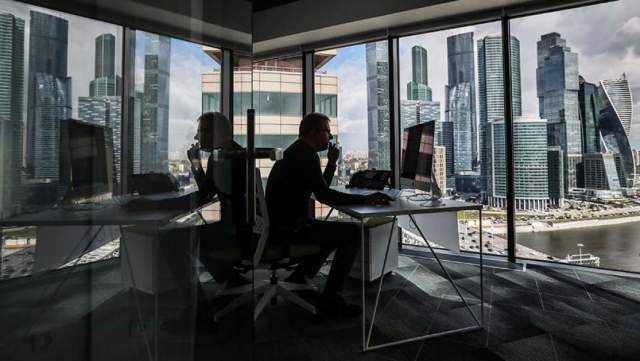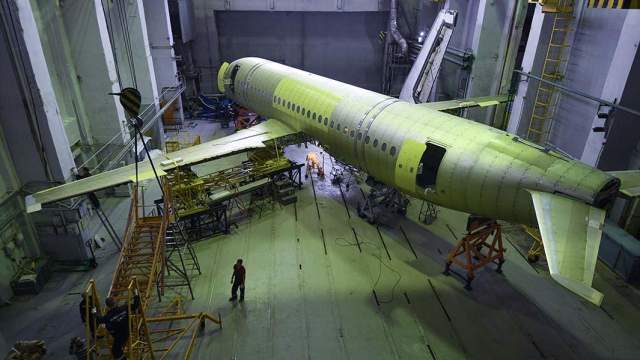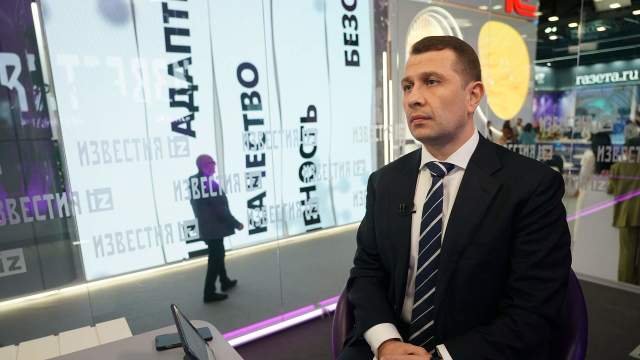First Deputy Head of the Ministry of Economic Development Ilya Torosov — about investments in the Russian Federation, the exit of domestic business from offshore and a new wave of privatization
In 2023, 29.7 trillion rubles will be invested in the Russian economy, which is 1.8 trillion more than in 2022. Ilya Torosov, Deputy Head of the Ministry of Economic Development, told about this in an interview with Izvestia at the SPIEF. He noted that due to the pressure of unfriendly countries, the transition of domestic companies from foreign jurisdiction to Russian continues. According to the Deputy Minister, aviation, infrastructure and production projects with high added value remain priority areas for development — the government will allocate more than 4 trillion rubles for them in the coming years. At the same time, in order to increase the attractiveness of the Russian economy, the Cabinet of Ministers is studying the possibility of partial privatization of large assets.
"Partial privatization is possible through this mechanism"
— The Ministry of Economic Development is responsible for attracting investments into the economy. How do you assess them in the current situation — have they increased or decreased since 2021? How much?
— We have good results in attracting investments: last year, compared to 2021, the growth was 4.6%. This is one of the best economic indicators in general, a lot of work has been done. But we are facing ambitious tasks — we need to attract almost 28 trillion rubles this year. The task for 2023 is to reach the level of 29.7 trillion rubles of investment in the Russian economy, which will be 1.8 trillion more than in 2022. We understand how we will implement this: there are a number of programs for interest rate resubsidization and risk sharing between investors and the state. It can also be done through the mechanisms of guarantees of development institutions. First of all, our enterprises need investments. Changes in logistics chains, the purchase of new equipment, new technological solutions will contribute to this.
— Are we talking about Russian business investments or are foreign companies also involved in this process?
— Foreign companies also invest in our economy, but mostly we are talking about Russian investments. Today we not only need to increase our own investments, but also to replace foreign investments from unfriendly countries — about 7 trillion rubles. However, most of these funds also had a domestic origin, just went through foreign legal entities. Now we rely mainly on friendly countries and our own market.

Photo: IZVESTIA/Alexander Kazakov
Image source: iz.ru
— Earlier, the market has repeatedly discussed the possibility of a new wave of privatization in Russia. Which companies can fall under it? Can this measure really be taken?
— I would not talk about the possibility of full privatization, a deep study of this issue is required. But the Ministry of Economic Development as a whole supports and sets up business for at least a partial IPO. Partial privatization is possible through this mechanism. Now the government is discussing such a measure and which companies it may affect. But no decision has been made yet.
"Many people just don't want to declare themselves bankrupt publicly"
— According to the draft law on out—of-court bankruptcy, more Russians will be able to count on debt cancellation - the amount of debt can start from 25 thousand rubles. How many citizens will potentially be able to fall under the new rules?
— At the moment, 17 thousand citizens have already applied for this procedure and 12 thousand have passed it. Potentially, hundreds of thousands of Russians fall under it, if we talk about the criteria that are prescribed. But only 10-20% of the potentially possible amount comes. First of all, this may be due to a psychological barrier — many people simply do not want to declare themselves bankrupt publicly. Or they do not see the expediency in this. But our task is to further develop this mechanism, expand its criteria and capabilities.
For example, in the first reading, the State Duma has already adopted amendments to extend it to pensioners. We hope that people will use this procedure more often and understand that this is not a stigma for life, but a normal legal practice for those who find themselves in a difficult life situation. I remind you that it is free, it can be done through the MFC.
— And what is the minimum amount that people go to to file for bankruptcy?
— The average check is 100 thousand rubles, before the minimum was 50 thousand rubles. If the new amendments are adopted, the minimum amount will be 25 thousand, and we will raise the maximum to 1 million. With this money, you can repay not only loans and obligations to financial organizations, but also debts to other individuals, taxes and fines — all this can also be written off through the simplified bankruptcy procedure.

Photo: Global Look Press/Elena Mayorova
Image source: iz.ru
— The Russian authorities and, in particular, the Ministry of Economic Development are discussing the possibility of zeroing the bankruptcy of individuals after a certain period of time. The term can reach 10 years or more. At what stage is this issue?
— At the stage of discussion and formation of common positions within the government. Now, within five years, a person who has gone through bankruptcy must declare to the creditor that he had such a procedure and restrictions on managerial positions are imposed on him, but after five years such restrictions end. It is necessary to work out the issue of completely stopping the mention of a person's bankruptcy in the information field in the past. This will increase the attractiveness of this procedure for people.
"Business should receive in Russia all the same opportunities for which it went offshore"
— At the St. Petersburg Legal Forum, you stated that the government is preparing a new plan for deoffshorization of business. Among the measures you mentioned are the "separate" payment of dividends and the opportunity for shareholders to change jurisdiction without losing their rights. Why, in your opinion, is deoffshorization of business required now? What other measures do you plan to take in this direction?
— Today, corporate decisions through foreign jurisdictions and offshore companies are not accepted in principle. Due to the actions of unfriendly countries, this brings operational problems for Russian business. That is, if you are doing business through a foreign jurisdiction, there are difficulties with attracting loans, buying and selling a business, restructuring. And in this regard, we are now taking enormous steps to change the business, which is so structured in the Russian jurisdiction.
On the one hand, the legal tools are being expanded so that companies in Russia receive all the same opportunities that they went offshore for. These include various types of shares, personal funds, corporate law, and interaction with foreign arbitration courts to resolve disputes. We have been doing this for five years, but we understand that this is not enough. It is necessary to give shareholders the opportunity to defend their corporate rights through a court in Russian jurisdiction if they are violated in a foreign jurisdiction. We are not talking about the redistribution of property, but about the restoration of corporate rights of shareholders who are infringed abroad. We also propose to introduce separate payments of dividends on bonds. The shareholder will be able to go to court, confirm his rights and ask to pay him dividends in the Russian jurisdiction so that the money does not go offshore and is not frozen there. The government agrees on the need for such a measure, and we hope to make appropriate legal amendments this year.

Photo: TASS/Sergey Savostyanov
Image source: iz.ru
— How has the number of companies registered in "Russian offshore" (SARAHS) changed over the past year? Are there plans to make them more attractive by introducing new benefits for residents?
— We see an increase in their number — 83 such companies appeared in 2022, which is three times more than in 2021. In just six months in 2023, there were 74. That is, the process is underway, companies are actively moving to the Russian Federation. It is clear that business abroad is under pressure, but here, in principle, they lose nothing — neither in tax prospects nor in corporate decisions. We are also currently working on legislative amendments, and perhaps the State Duma will adopt them next year. According to them, the transfer of the company to the Russian jurisdiction will be possible by the decision of the shareholders. We will also extend up to five years and the possibility of double actual registration, so that the transition is smoother.
In addition, we plan to grant the right to the government to make a decision on changing jurisdiction not only by the decision of shareholders, but also by the decision of the board of directors of companies. In May, a bill was passed in the first reading, according to which the SAR is now allowed not only to move, but also to create a new company, incorporation with foreign participation with mandatory transfer of assets in foreign ownership. This is a big step, because in fact, a full-fledged one is being created in Russia from a jurisdiction to which they simply move, in which you can organize a company from scratch. Now 211 such players have already been registered in the SAR, we assume further growth. We expect more than 250 this year.
"The main priority is projects with high added value"
— Are you planning to direct the NWF funds to projects in the fuel and energy sector and aviation in the coming years? If so, what projects and what amounts?
— Yes, we are planning to. The main priority is projects with high added value, large infrastructure projects. We have already financed 1.2 trillion. 4.2 trillion rubles have been allocated for these projects until 2025. And based on the result of 2023, we think that we will reach the already so-called signed projects in which we will start financing or assume obligations. It was planned to allocate funding in the amount of 2.5 trillion rubles for this year, but I hope that this year we will be able to get out of the limit of 4.2 trillion.
About 1 trillion will be allocated for the development of the domestic fleet of aircraft, land and water transport, and about 1 trillion will be allocated for projects of the fuel and energy complex with high added value.

Photo: RIA Novosti/Alexander Kryazhev
Image source: iz.ru
— What other projects are in priority?
— Construction of roads, infrastructure, technology development, as well as support for the capitalization of Aeroflot and Russian Railways and their investment programs. For example, the development of the Trans-Siberian Railway, the creation by Aeroflot of its aircraft maintenance infrastructure. They also have plans for KPIs in terms of fulfilling the number of full—fledged boards on the territory of the Russian Federation - for this it is necessary to create an infrastructure.
Money is also being sent to buy out aircraft with dual registration from foreign lessors. Up to 300 billion rubles have been allocated for this direction. In addition to Aeroflot, other airlines, such as S7, can also receive support.
It is important for us to buy the planes officially, to remove the double registration so that they can serve international flights, because passenger traffic is growing every day.
Funds will also be allocated for the renovation of the St. Petersburg metro - for cars and the locomotive part.
— What would you identify the main pain points of the Russian economy today that are being worked on?
— The main pain point is attracting investments. We need to give normal long-term investments at a normal price for technological transformation, sovereignty and import substitution. This is what we focus on. We have achieved good results in 2022. We intend to continue doing this in 2023. Now our task is to create a foundation for the technological development of the country and attract investment for the coming decades. And we are already building long-term programs.
Irina Tsyruleva
Valery Voronov

